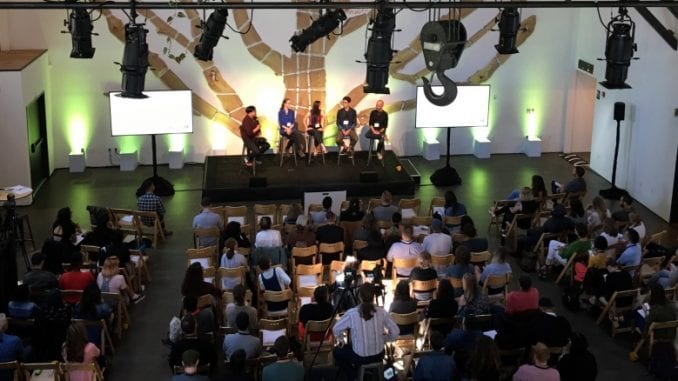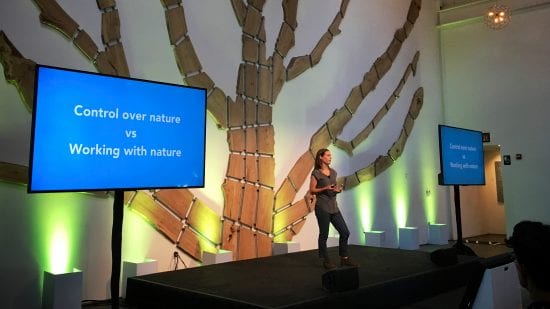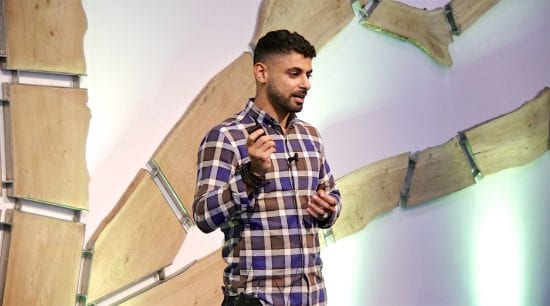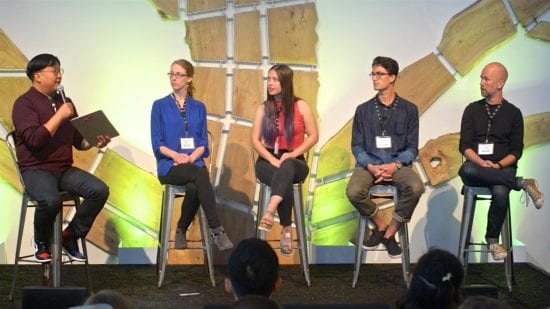
Ideas and questions were abound at Bloom San Francisco, opening up discussions regarding biodiversity, natural wine, fast food coffee, and marginalization in the coffee industry.
BY ASHLEY RODRIGUEZ
BARISTA MAGAZINE ONLINE
Photos courtesy of SCA
Bloom, a series of events hosted by the Specialty Coffee Association (SCA) and coordinated by its assisting body, the Barista Guild of America (BGA), sparked three days of lectures, discussions, and ideas last week in San Francisco. This iteration of the event, which was the third of its kind, brought together coffee professionals from all across the nation, who engaged in debate and discussion in a number of different formats. “Personally, I was so excited to see Bloom in San Francisco, a city I love and take many forms of inspiration from,” shared Todd Mackey, chair of the BGA. “The most inspiring piece overall, however, was to see so many individual leaders and leading companies from the San Francisco and entire Bay Area coming together with such grace and appreciation for one another. The ideas presented, dialogue it precipitated, and community fostered was beautiful to witness, and I am so proud and thankful that the BG is able to amplify this via the satellite events and Bloom video/podcast series looking forward.”

Guests and panelists at Bloom were invited to share ideas and spark discussions to push the coffee industry further. Here are some of the biggest takeaways we got from the lively discussions at Bloom:
- The struggles we’re facing in coffee now are not new.
“2013 should have been a big wake up call for us,” shared Mokhtar Alkhanshali, founder of Port of Mokha, a coffee company that focuses on importing and highlighting the coffees of Yemen. In his talk, Mokhtar urged the community to look to the past for answers to the problems plaguing coffee today, like the drastic loss of crops due to Roya in 2013. He talked of Sri Lanka, a country that also lost most of its coffee crops to Roya decades ago, and how we have the blueprints to avoid another crisis. “Coffee faces a genetic bottleneck,” he shared, noting the lack of genetic diversity in many coffee-producing countries, leading to disease and the wiping out of whole crops.

Mokhtar encouraged listeners to look to Yemen, which, depending on what story you’re told, is the birthplace of coffee. Mokhtar has been praised for bringing some of the world’s tastiest coffees to a specialty audience, but he’s also proud of how sturdy and sustainably processed the coffees from Yemen are. “It was great that this coffee grew well and it was disease resistant, and it was a plus that it also tasted great,” Mokhtar said. He added that he believes the future is in naturally processed coffees, using less water to process, and hinted at the upcoming release of a book based on his journey to Yemen.
- We’re working on making coffee more accessible for more people.
On the panel “Fast, Cheap, Good: Choose Two,” leaders in coffee came together to discuss a topic we haven’t been so great at tackling in the specialty-coffee world: how to make coffee more accessible, led by Nick Cho of Wrecking Ball Coffee Roasters. Molly Irwin of Fellow Products talked about engineering consumer-friendly products, Umeko Motoyoshi of Sudden Coffee and Kent Sheridan of Voila Coffee talked about removing barriers of brewing with instant coffee, and Tony (Tonx) Konecny of LocoL spoke about bringing cheaper coffee to larger audiences.

“We disempower our potential customer by making coffee seem very difficult,” Tony noted. “In chasing differentiation, we’ve made coffee unattainable.” Panelists covered a number of topics—perhaps too many to give enough attention to any one fairly—and the audience asked thoughtful questions. (For example: “If we make coffee cheaper, do we undervalue the work of the farmer and the baristas?”) This panel could have gone on for hours and hopefully encouraged thoughtful debate.
- Natural wine means embracing nature, not defying it.
“A grape contains everything necessary to make wine,” shared Martha Stoumen, a natural winemaker and owner of Martha Stoumen Wines. She spoke of the differences between conventional wine, which uses methods like additives to make wine more consistent, and natural wine, which showcases the grapes themselves and avoids adding anything to speed up the winemaking process or mask the natural flavors the wine exhibits.

“Natural winemaking showcases the diversity of nature,” she shared, which was a thought-provoking idea for the coffee community she spoke to. In coffee, we generally prize consistency, embracing batch brewing over manual brew methods and discussing ways to achieve consistency in cherries from year to year, but natural winemakers follow what nature tells them. Is this a trend we’ll start seeing in coffee? Perhaps—the expressiveness and beauty of Martha’s wines, which she offered the group to taste at a Bloom event the day before, suggest there are lessons for us to learn.
- There are still some big issues to tackle.
Lastly, Jasper Wilde, Liz Dean, and myself, on behalf of the Boss Barista podcast and the BGA, talked about recognizing privilege and using it to tackle big issues in coffee. After a short exercise, which asked participants to engage and think about the privilege they’ve been afforded throughout their lives, the group was broken into four discussion circles. Each group leader talked about a different topic facing the coffee industry: sexual harassment, gentrification, intersectionality, and queer- and trans-inclusive language.
As you can imagine, all these topics could have their own talks. Groups were engaged and lively, and hearing coffee professionals from a variety of different backgrounds share their perspectives was touching, promising, but indicative that there’s still a lot to do. “I’m a little bit older, and so many of these issues we’ve been conditioned to internalize, so it’s interesting and empowering to see what younger women will not stand for because we’ve been taught that these are things we have to accept,” shared one participant about gender discrimination. Group members shared ideas, asked for advice, and even debated ideas, learning from—and sometimes disagreeing with—not just group presenters, but their fellow coffee colleagues.
This year’s Bloom was filled with hard discussions and meaningful exchanges. Did we find any definitive answers? Perhaps not, but we began on a course of enacting positive change. As I sit and write this, I’m thinking about the lessons I learned and the takeaways I felt were the most thought-provoking—I admit the discussion I led at Bloom left some members of our industry out, and didn’t provide a call to action as strongly as I would have liked. However, instead of focusing on definitive answers, Bloom is meant to push dialogue, get people thinking, and provoke an exchange of ideas. If you were at Bloom, please share with us what you felt were some of the most important ideas and what you’re still thinking about in the Comments section!

